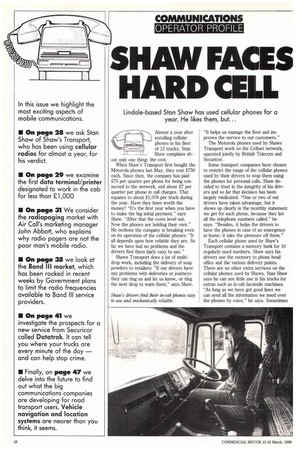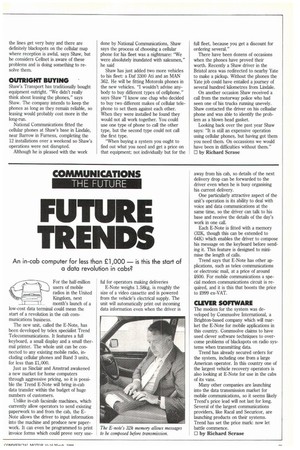SHAW FACES HARD CELL
Page 38

Page 39

If you've noticed an error in this article please click here to report it so we can fix it.
Almost a year after installing cellular phones in his fleet of 12 trucks, Stan Shaw complains about only one thing: the cost.
When Shaw's Transport first bought the Motorola phones last May, they cost £750 each. Since then, the company has paid £75 per quarter per phone for being connected to the network, and about £7 per quarter per phone in call charges. That equates to about £1,078 per truck during the year. Have they been worth the money? "It's the first year when you have to make the big initial payment," says Shaw. "After that the costs level out. Now the phones are holding their own." He reckons the company is breaking even on its operation of the cellular phones: "It all depends upon how reliable they are. So far we have had no problems and the drivers find them fairly easy to use."
Shaws Transport does a lot of multidrop work, including the delivery of soap powders to retailers: "If our drivers have any problems with deliveries or journeys they can ring us and let us know, or ring the next drop to warn them," says Shaw. "It helps us manage the fleet and improves the service to our customers."
The Motorola phones used by Shaws Transport work on the Cellnet network, operated jointly by British Telecom and Securicor.
Some transport companies have chosen to restrict the range of the cellular phones used by their drivers to stop them using the phones for personal calls. Shaw decided to trust in the integrity of his drivers and so far that decision has been largely vindicated. "One or two of our drivers have taken advantage, but it shows up clearly in the monthly statement we get for each phone, because they list all the telephone numbers called." he says. "Besides, it helps the drivers to have the phones in case of an emergency at home: it take the pressure off them."
Each cellular phone used by Shaw's Transport contains a memory bank for 10 regularly used numbers. Shaw says his drivers use the memory to phone head office and the various delivery points. There are no other extra services on the cellular phones used by Shaws. Stan Shaw says he can see little use in his trucks for extras such as in-cab facsimile machines. "As long as we have got good lines we can send all the information we need over the phones by voice," he says. Sometimes the lines get very busy and there are definitely blackspots on the cellular map where reception is awful, says Shaw, but he considers Cellnet is aware of these problems and is doing something to resolve them.
Shaw's Transport has traditionally bought equipment outright. "We didn't really think about leasing the phones," says Shaw. The company intends to keep the phones as tong as they remain reliable, so leasing would probably cost more in the long-run.
National Communications fitted the cellular phones at Shaw's base in Lindale, near Barrow in Furness, completing the 12 installations over a weekend so Shaw's operations were not disrupted.
Although he is pleased with the work done by National Communications, Shaw says the process of choosing a cellular phone for his fleet was a nightmare: "We were absolutely inundated with salesmen," he said Shaw has just added two more vehicles to his fleet: a Daf 3300 Ati and an MAN 362. He will be fitting Motorola phones in the new vehicles. "[wouldn't advise anybody to buy different types of cellphone." says Shaw "I know one chap who decided to buy two different makes of cellular telephone to set them against each other. When they were installed he found they would not all work together. You could use one type of phone to call the other type, but the second type could not call the first type.
"When buying a system you ought to find out what you need and get a price on that equipment; not individually but for the full fleet, because you get a discount for ordering several."
There have been dozens of occasions when the phones have proved their worth. Recently a Shaw driver in the Bristol area was redirected to nearby Yate to make a pickup. Without the phones the Yate job could have entailed a journey of several hundred kilometres from Lindale.
On another occasion Shaw received a call from the motorway police who had seen one of his trucks running unevely. Shaw contacted the driver on his cellualar phone and was able to identify the problem as a blown head gasket.
Looking back over the past year Shaw says: "It is still an expensive operation using cellular phones, but having got them you need them. On occassions we would have been in difficulties without them." El by Richard Scrase








































































































